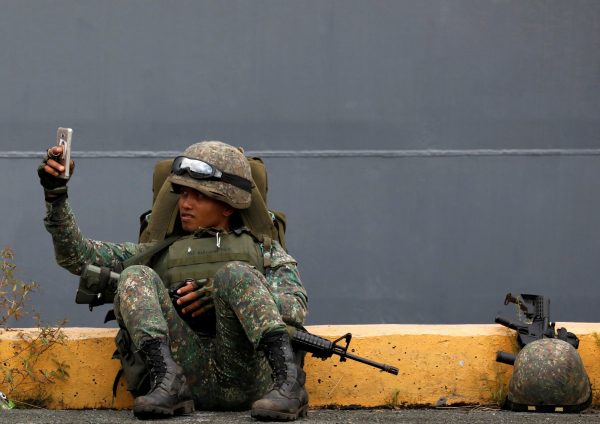In January 2018, members of the IS-affiliated Maute group attacked troops of the Joint Task Force Ranao, injuring six before escaping by boat from Lake Lanao (less than 40 kilometres from Marawi city). The attack was the first clash between militants and government forces since the end of the Marawi battle, and there are concerns that it may only be one of more to come.
Despite being forced to retreat, IS-affiliated militants claim the Marawi siege as a victory. Videos of the Marawi attacks continue to be circulated online and the Maute brothers are glorified as heroes by Filipino IS supporters. The Maute group and its allies failed to capture the city and convert it into an IS outpost. But the group’s ability to hold the Philippines military off for months captured the attention of global IS-affiliated militants, some of whom have since migrated to the Philippines as foreign fighters.
The Maute group also systematically looted millions of dollars from homes, banks and shops during the drawn-out battle for Marawi. It will use these to promote recruitment and replenish its military capabilities. The military expects that the militants may have the resources to conduct renewed attacks in the future.
Having witnessed the destruction and social disintegration of their city, local government officials and residents are supportive of military operations to wipe out the remaining militants. The destructive manner in which the Maute group and its allies conducted their battle for Marawi showed that they are not interested in meeting the real political and economic development needs of Filipino communities.
The Armed Forces of the Philippines’ Western Mindanao Command (Westmincom) claims that it is making great strides in diminishing the capabilities of the IS-affiliated Abu Sayyaf group (ASG) in Sulu, Basilan and Tawi-Tawi provinces. Since operations began last year, 128 ASG members have been killed, 80 arrested and 150 others have surrendered.
Notably, Westmincom has managed to achieve strategic control of the Sulu and Tawi-Tawi waters in the tri-border area between the Philippines, Malaysia and Indonesia. Control of these waters is helping to prevent the high-profile kidnappings-for-ransom that have plagued the area since 2000 and have provided a crucial source of funding for ASG.
The autonomous regional government of Mindanao is also working with local Islamic scholars to rehabilitate militants who surrender, and is funding infrastructure and economic development initiatives to encourage militants to give up their firearms. Together with the effects of military pressure, these programs are expected to be the beginning of the end of the ASG.
But such programs –- as well as the Bangsamoro Basic Law that will likely be passed this year — are also propaganda fodder for radicalisation. Peace initiatives have been framed as anti-Islamic, and Muslims who are supportive of peace are labelled as traitors and could be targeted by terrorists who seek to garner support through fearmongering. There is also the possibility of peace programs falling apart and leading to violence if they are seen to benefit certain ethnic groups or families more than others.
If Westmincom does not follow through on its strategy in Mindanao, it is possible that another Marawi-esque battle will occur. Intelligence reports maintain that the leaders of IS-affiliated militant groups in the Philippines — such as Amin Baco, Muawiyah and Abu Turaifie — are still alive. With millions of dollars in loot still unrecovered and available for recruitment purposes, it is likely that Filipino militants are organising their next big move.
New IS-affiliated cells reportedly continue to emerge in Jolo, Cotabato and Basilan provinces. There are also reports of a female unit of militants comprising local Marawi women as well as women from other parts of the Philippines who have been radicalised online. With IS now including females in the frontlines, the Philippines military must factor this into its strategy.
The above revelation is part of a broader trend of online radicalisation of Filipino Muslims in other parts of the Philippines as well as in the larger diaspora. In the past few months, new social media groups have emerged that bring together radicalised Filipino Muslims who live in Manila, Basilan and Mindanao, as well as in Morocco, the Netherlands, Germany, South Korea, China and the United States.
While the battle for Marawi may have ended, the danger of violent extremism and terrorism in the Philippines is far from over. Continued government efforts to combat militancy must now confront the re-emergence of IS-affiliated groups and the very real possibility of another Marawi-type conflict in the near future.
Jasminder Singh is Senior Analyst with the International Centre for Political Violence and Terrorism Research, a constituent unit of the S Rajaratnam School of International Studies (RSIS), Nanyang Technological University, Singapore.
A version of this article originally appeared here on RSIS.

